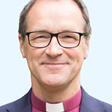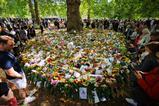Every revival in history has been accompanied by a simultaneous renewal of theology. Yet, as the recent closure of Spurgeon’s College shows, the Church today is in urgent need of fresh investment in the next generation of theologians, says Graham Tomlin

This summer, one topic seems to be on everyone’s lips.
On Christian websites, at Christian festivals and even in the mainstream media - everyone is talking about the claimed quiet revival.
Questions abound. Is it a revival? Why is it quiet? Why are young men in particular returning to church? Why does the Bible Society’s survey seem to fly in the face of other surveys that continue to predict decline? What do we make of the various professions of faith from people like Russell Brand, Nick Cave and Giles Coren?
It’s clear that there has been a definite shift in the public narrative - from the strident anti-religious voices of Richard Dawkins and Christopher Hitchens to the Christian-adjacent views of Jordan Peterson and Tom Holland.
It may be a greater openness to spirituality rather than full-blown revival, but if anecdotes from church leaders from all kinds of denominations are anything to go by, something may just be stirring. And if it is, we ought to prepare for it.
Rediscovering God
Looking back on previous ‘revivals’ of faith, it is hard to think of one that has had a deep and lasting impact without being accompanied by a simultaneous renewal of theology. Each has seen a re-discovery of some forgotten aspect of Christian faith, a retrieval of the depths of Christian reflection on who God is, who we are and what the world is, or an insight into how Christian faith satisfies the longings of a particular age.
If this is a revival – quiet or otherwise - it will be no different.
Perhaps the greatest revival of all (although we often don’t think of it as a ‘revival’ because it was the very beginnings of the Christian story) was the explosion of faith across the Roman empire in the first few centuries after Jesus’ death and resurrection.
This growth was accompanied by a serious exploration of the Church’s own beliefs about Christ and their experience of God’s ongoing presence. This led early Christians to ask profound questions about their understanding of God.
Through the ages
It began with the second century apologists such as Justin Martyr and Clement of Alexandria and continued with Athanasius, the Cappadocian fathers and St Augustine. The result was the doctrine of the Trinity, painstakingly articulated over centuries, as the Church sought to express their faith to suspicious pagans - and pass it on to their children.
The best theology is nothing other than a fresh vision of God
The Christian faith took root in Europe because of the sincerity of faith of simple Christians. Yet it was also because Christian thinkers offered compelling responses to the longings of the age for wisdom and moral renewal - a different and better vision of reality than was found in paganism - all rooted in the revelation of God in Jesus Christ.
As Europe emerged from the barbarian invasions towards the end of the first millennium, an expansion of Christianity was accompanied firstly by the Carolingian Renaissance and later by the writings of St Anselm and Thomas Aquinas, who explored the internal rationality of Christian faith and its ability to make sense of everything else.
Then, as the early modern age dawned, the Reformers – most famously Martin Luther and John Calvin – re-discovered how the doctrine of justification by faith and divine election offered peace of heart and conscience in an anxious age.
The 18th century evangelical revivals associated with John Wesley and George Whitefield were accompanied by the careful theological work of Jonathan Edwards, who explored how God’s glory was manifested in redemption and conversion. When the philosophers of the Enlightenment were searching for rational certainty, Edwards showed how faith, allied to true affections, gave a more heartfelt and personal sense of certainty than reason ever could.
I could go on. Arguably revivals that failed to generate an accompanying theological renewal didn’t last as long and fell short of the centuries-long impact that those mentioned above had.
Articulating impact
Theology matters because the focus of any true revival of faith is not the revival itself, but a renewed fascination with the God of Jesus Christ, who made us and redeemed us. True revival involves re-discovering forgotten visions of the God of the Bible and exploring how faith in that God meets the true yearnings of any particular age or culture.
Which all leads to a key question: If we are among the first stirrings of a renewal of faith in the supposedly secular West, where is the theological renewal that will accompany this? Who are the theologians who will articulate its impact in this cultural moment?
Looking back on previous revivals, each has seen a re-discovery of some forgotten aspect of Christian faith
Attending this summer’s Christian festivals, there were calls - as there often are - to pray for and commission those called to church ministry, to new initiatives in the workplace, for church planters and pioneers, but few if any for the new generation of theologians who will train those church and lay leaders, and articulate the insights of a fresh sense of the presence and power of God.
This is particularly acute in the evangelical and charismatic parts of the Church, which are seeing some of the fruit of this new openness to spirituality, yet have not always taken theology and the vocation of the theologian seriously. Sometimes that part of the Church (to which I guess I belong) is prey to a kind of anti-intellectualism, as if direct experience of God or heartfelt worship is all that matters, and pondering the meaning of such an encounter or taking care to express a true picture of God in our worship is unimportant.
The next generation
We sometimes take our theologians for granted, perhaps seeing theology as a box to be ticked for those training for church leadership. Of course, church planters, ministers and lay leaders will need training in a deep knowledge of the faith. Yet theology is needed in its own right, because the best theology is nothing other than a fresh vision of God as the true source of all beauty, wisdom and grace.
This is even more urgent in the light of the recent closure of long-standing seminaries such as Spurgeon’s College - and the battles of many other such places to survive. Fewer options for study mean fewer people studying theology and taking their first steps towards becoming theologians.
Without such deep theological reflection, any revival is likely to be short lived and blown away with the first wind of opposition. But with it, it will connect with the great tradition of Christian faith through the centuries. It will be able to answer the questions and objections of those who may be initially sceptical but are ready to listen to thoughtful articulations of faith and how it makes sense of life.
Revivals are not planned. They are not the result of strategies dreamt up by ecclesiastical head offices. Yet when they come, they are to be stewarded and nurtured through new forms of worship, structure and leadership. If this revival is real – and only time will tell – the Church will need to identify, equip and affirm a new generation of those called to deep reflection on the Bible, the Christian tradition and the nature of our experience of God.
We need our priests, pastors and preachers. And we also need our theologians – those ‘doctors of the church’ who watch over its health, prescribe good medicine and know it inside out. Nothing less will do.






































1 Reader's comment